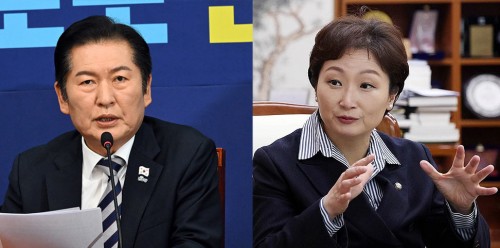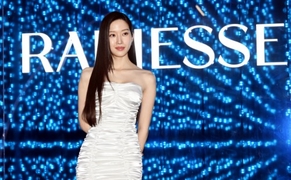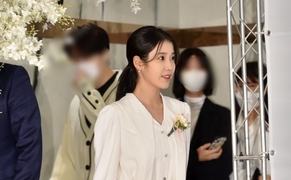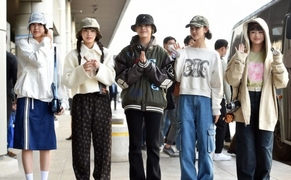 |
| Democratic Party leader Jung Chung-rae (left) and Supreme Council member Lee Un-ju. / Source: Yonhap News |
The Democratic Party is facing an escalating internal conflict over proposed amendments to its party constitution and rules that would give equal voting weight to delegates and dues-paying members — a shift often described as a “one member, one vote” system.
The dispute flared after Supreme Council member Lee Un-ju publicly criticized the reform as being pushed through hastily, prompting party leader Jung Chung-rae’s camp to deny her claims and attempt to contain the fallout. The situation intensified further as the pro-Lee Jae-myung factional group “Democratic Innovation Council,” composed mainly of former lawmakers, entered the debate.
According to political sources on Saturday, Lee’s open challenge against the reform triggered a surge of internal pushback. In a recent Facebook post, she wrote that “although nearly half of the Supreme Council expressed concern and called for deliberation, the reform was pushed through in a rushed or impulsive manner.” She added that it was illogical for the leadership to describe the outcome as “overwhelming support” when only about 240,000 of the party’s 1.64 million dues-paying members — just 16.8 percent — voted in favor.
Facing growing criticism, Jung’s camp issued a rebuttal. Senior spokesperson Park Soo-hyun wrote on Facebook on November 22 that it was “not true” that the reform was driven only by a handful of party leaders. He stressed that the proposal represented “a central theme of the August 2 convention, a consensus among party members, and a campaign pledge of the party leader.”
Park also rejected claims of a rushed process, saying the reform had been “reported multiple times to closed Supreme Council meetings and thoroughly explained at the national workshop of local party chairs.” He said the final vote — seven in favor and two against — came after listening to arguments that “more time for deliberation was needed.”
The debate expanded further when the pro-Lee faction’s Democratic Innovation Council issued a sharply critical commentary the same day. While acknowledging the intent of equalizing delegate and member votes, the group argued that the method of opinion-gathering, procedural legitimacy and timing raised widespread frustration among party members. They noted that “83.19 percent of dues-paying members did not participate in the poll,” calling the leadership’s talk of overwhelming support “embarrassing self-praise.” The group also questioned the timing: “Did this really need to be pushed forward while President Lee Jae-myung was abroad at the G20?”
Rep. Kang Deuk-gu also weighed in on Facebook, writing, “Strengthening member sovereignty is clearly the right direction — a principle pursued since President Lee Jae-myung’s time as party leader, and consistent with Chairman Jung Chung-rae’s pledge.” But he stressed that “just as important as member sovereignty is completing the vision of a national-level party,” long championed by former Presidents Kim Dae-jung and Roh Moo-hyun. He warned that abolishing all complementary mechanisms in the name of adopting a one-member-one-vote system would amount to “a hasty reform that undermines the party’s history, identity and values.”
Underlying the turmoil is speculation that the reform could strengthen Jung’s prospects for re-election as party leader by weakening the delegate system and amplifying the influence of core supporters among dues-paying members.
Jung, however, reaffirmed his commitment to the reform during a special lecture in Naju on November 22. “It is time to build a party that reflects member sovereignty, befitting an era of popular sovereignty,” he said, adding, “I will give up the party leader’s nomination authority first.”
The Democratic Party plans to vote on the amendments at the Party Affairs Committee on November 24 and the Central Committee on November 28.
Most Read
-
1
-
2
-
3
-
4
-
5
-
6
-
7





















